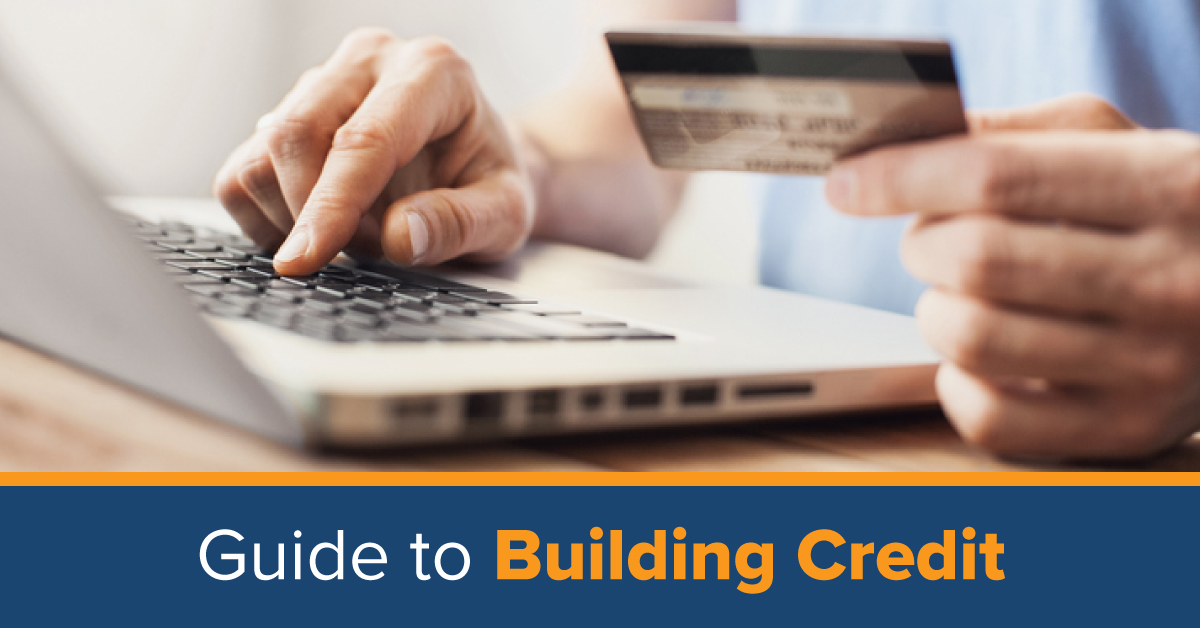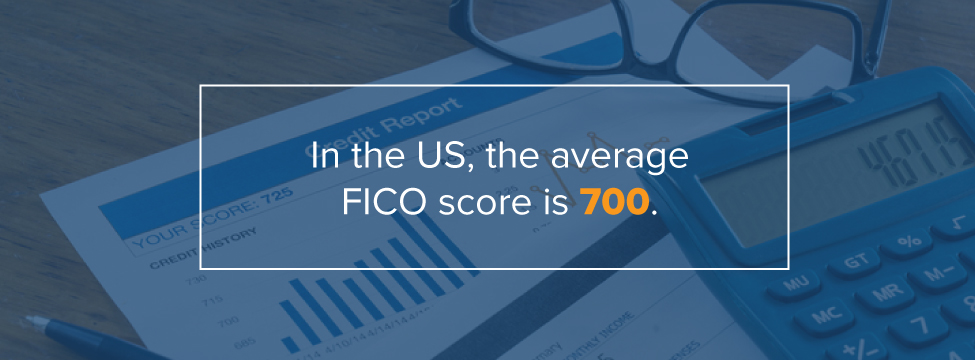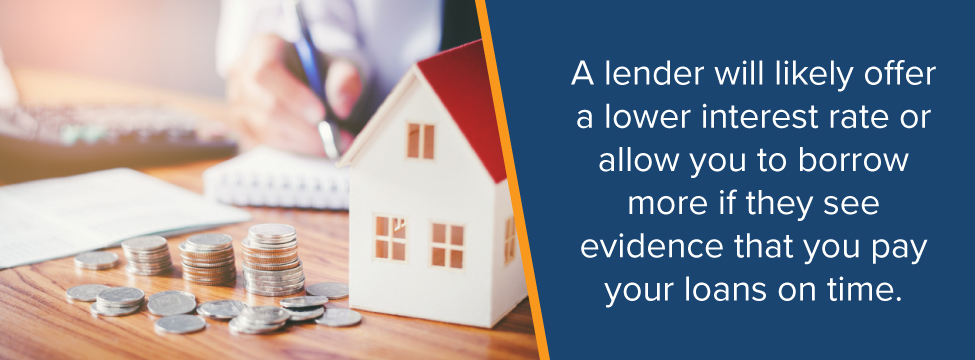Guide to Building Credit

Whether you are hoping to apply for a mortgage, a car loan or a credit card, you usually need to have some history of credit to qualify. For many people who are at the beginning of their financial lives, getting credit can be difficult. After all, it often seems that you need to have credit to get credit and that there aren’t any ways “in” unless you already have a history of borrowing money.
The good news about building credit is that it gets easier with time. The not-so-good news is that it can seem downright impossible to get that first loan if you have insufficient credit history or no history at all. Fortunately, there are a few ways to establish credit, allowing you to get on the path towards reaching your financial goals.
What Is Credit?
Credit is your ability to get services or goods before paying for them. When a company, such as a bank or other type of lender, gives you credit, it expects you to repay it in the future, usually on a specific payment schedule. To protect itself and cover the cost of extending credit to you, the bank or lender typically charges interest. Interest is often a percentage of the value of the item or the amount you borrow.
Credit takes several forms and is measured in several ways. Some of the more common types of credit include:
- Installment loans. When you take out an installment loan, you agree to pay back the value, or principal, of the loan over a specific period, in regular installments (or payments). Student loans, which are often paid back over the course of 10 years after graduation, and auto loans, which are usually paid back over the course of 60 months, are two common types of installment loans.
- Revolving credit. While you receive the money from an installment loan in one lump sum and need to pay back the entire amount, with revolving credit you are eligible to borrow or use a certain amount, but you don’t have to borrow the full amount. As you repay the balance on a revolving credit line, you can borrow against it again. Credit cards are a common form of revolving credit.
- Mortgages. Mortgages are technically a type of installment loan but have their own category. They are the loan you take out to cover the purchase of a home. While you are repaying your mortgage, your home serves as collateral, meaning the lender can claim your house if you are unable to repay your mortgage.
Along with different types of credit, there are various ways that credit is measured. People with credit have a credit history and credit scores.

Credit history refers to all the financial transactions and accounts that make up your financial life. Your credit history doesn’t just include the accounts you have in your name, but also your record of paying those accounts, how much you’ve borrowed or can borrow, and how long you’ve had each one.
Usually, your credit history is included on a credit report, which is compiled by a credit reporting bureau. In the US, three agencies collect credit information and prepare credit reports:
- Equifax
- TransUnion
- Experian
Along with your credit history, your report also includes information about you, such as your birthday, current and past addresses, employment history and other details.
While your credit history can give a potential lender an idea of your experience with loans and credit, your credit score provides a lender with a sense of your overall credit risk. The companies that calculate credit scores use secret formulas to determine what type of rating to give to people based on their credit history.

The classic Fair Isaac Corporation (FICO) score is one of the more well-known scores, but Vantage Score also calculates credit scores. Scores typically range from 300 to 850, with the higher score reflecting a better credit history. In the US, the average FICO score is 700.
Although neither FICO nor Vantage Score reveals the exact formulas they use to calculate scores, FICO has given a glimpse into the factors it uses when determining scores and the value it places on those factors. They include:
- Payment history. Your payment history is the most significant factor, making up about 35 percent of your score. It refers to whether you have a record of paying on time or of missing payments.
- Amounts owed. How much you owe across your accounts also influences your score, making up 30 percent of your score. The amount owed refers to how much you’ve borrowed against your limit on credit cards and revolving accounts as well as how much you have outstanding on installment loans.
- Length of credit history. Length of credit history is just how long you have had credit. Your credit history begins when a bank or lender starts reporting an account to a credit agency.
- New credit. New credit refers to accounts that are less than two years old. It makes up 10 percent of your score. Ideally, you’ll want a mix of older and newer accounts, rather than only new accounts.
- Types of credit. The more diverse your credit mix, the less of a risk you seem to be. Types of credit refer to installment loans, mortgages, credit cards and so on. It makes up 10 percent of your score.
Why Build Credit?

One of the more obvious reasons for building credit is that doing so allows you to apply for and get the best possible rates on certain loans, such as mortgages. A lender will likely offer a lower interest rate or allow you to borrow more if they see evidence that you pay your loans on time, you haven’t borrowed a lot and haven’t recently opened a considerable number of new accounts.
How Your Credit Affects Your Life
Your credit history doesn’t just influence your financial life, though. Other institutions or individuals might look at your credit when making an important decision about you.
- Landlords. Even if buying a house isn’t a goal for you right now or shortly, having no or very little credit can still influence where you live. Many landlords or rental companies run a credit check before agreeing to lease property to a person.
- Employers. A potential employer might run a credit check on you before making a job offer. Some employers look at having a positive credit history as a sign that a person will be a responsible and trustworthy employee. A lengthy, positive credit history is usually particularly crucial for positions that deal with finance or that involve leadership. The credit report an employer sees isn’t the same as the reports a lender or financial institution sees.
- Utility companies. Although the payments you make to your cable, gas or electric company don’t usually get included on your credit report, those companies can check your credit before taking you on as a customer. If they don’t think you have a substantial enough credit history, they might ask you to make a deposit before they turn on the lights or TV.
- Insurance companies. Auto insurance companies often run a credit check before giving you a rate quote. Having a positive credit history can mean you end up paying less than a similar driver with no or a very short history.
- A spouse or partner. Most people don’t ask for a credit report on a first date but having a limited credit history can be detrimental to your romantic pursuits. You and your partner might eventually want to combine finances or apply for a loan together, which can be difficult if one of you doesn’t have any credit.
How to Build Credit
Although improving your credit does get easier the longer you’ve had credit and the more credit you have, getting your foot in the door isn’t impossible. When you are just starting out, you have a few options for establishing credit.
Have Someone Add You as an Authorized User on a Credit Card
An authorized user is someone who is allowed to use another person’s credit card, but who isn’t directly responsible for the amount borrowed. Some credit cards report authorized users to the reporting agencies, which can be beneficial if you don’t have any credit history at all.
It’s important that you pick someone who has a good credit history and who doesn’t regularly max out credit cards. You’ll be benefiting from that person’s own payment history and credit usage. The better their credit, the better off you’ll be.
Apply for Your Own Credit Card
While some credit cards are reserved for people with long, positive credit histories, not all are. Some are meant specifically for people with limited or damaged credit histories.
Some people use secured cards to build or re-establish credit. To obtain and use a secured credit card, you need to make a deposit. That deposit then acts as collateral, giving the bank or lender some reassurance if you do end up missing payments.
Not all secured cards are the same. It’s a good idea to look for one without an annual fee and one that reports to the three credit agencies.
Instead of a secured credit card, you might consider opening a store credit card with a retailer you shop with regularly. Store credit cards don’t require a deposit but often have more relaxed rules when it comes to approving applicants.
One of the reasons why it’s relatively easy to get a store credit card, even without a credit history, is that they tend to have higher interest rates than other types of credit card. For that reason, it’s important not to use your store credit card too much. Only use it when you can pay it off in full, right away.

Apply for a Student Loan
Using a federal student loan to cover some of your expenses as you head off to college or graduate school can help you establish credit. For the most part, federal student loans don’t require a credit check before you are approved. As long as you don’t borrow too much to pay for school, a student loan can be an excellent way to start building credit.
Ask Someone to Co-Sign a Loan With You
A lender might be wary of a person without much or any credit history. But if a parent or spouse with a longer history is willing to co-sign with you, even if you take on full responsibility for the payments, the lender might reconsider.
You may be able to use a co-signer to open a credit card or to qualify for a personal loan or another type of installment loan. It is important to be upfront with a person when you ask him or her to co-sign with you. If you are unable to pay the loan as agreed, the co-signer is responsible for making payments. That can mean that both of your credit histories suffer if anyone misses payments.
Apply for a Credit-Builder Loan
Credit-builder loans are designed for people with limited or no credit histories. As you might guess, they are meant to be stepping stones, helping you get that first piece of credit so that you can start building a healthy credit history.
One way to look at a credit-builder loan is as a type of layaway. When you put something on layaway, you make regular payments towards it. You usually have a set amount of time to make the payments. Once you’ve paid the full cost of the item, the store lets you officially buy it and bring it home.
With a credit-builder loan, you make regular payments on the loan, but you don’t receive the money upfront. Instead, the principal amount is released to you after you’ve paid the full amount. The goal of the loan is to help you get in the habit of making payments. It also can help you build up a positive credit history.
Tips on Building Credit
Whether you decide to open a credit card, take out a student loan or work with a co-signer, remember these tips to help you build credit successfully.
- Always pay on time. Remember that payment history has the most significant impact on your credit score. Make sure you pay your bills on time. If you’re worried you’ll forget, set up automatic payments or make a note on your calendar.
- Charge small amounts. A credit card isn’t free money. When you’re just getting started with building your credit, you should use your card sparingly. For example, you might want to buy one week’s worth of groceries with it each month and then pay it off right away.
- Don’t rush out and open a bunch of accounts at once. Once you get that first credit card or loan, you might want to get more, thinking it will help your credit. But having too many new accounts on your credit report will lower your score.
- Don’t close old accounts unless you must. The longer you’ve had a credit card open, the longer your credit history. Unless the card has a hefty annual fee, it’s a good idea to keep it open indefinitely, even if you don’t use it that much.
If you are ready to start building credit and are interested in using a credit card to do so, check out the credit card options offered by Mid Penn Bank today.
Share:
Disclosures
The material on this site was created for educational purposes. It is not intended to be and should not be treated as legal, tax, investment, accounting, or other professional advice.
Securities and Insurance Products:
NOT A DEPOSIT | NOT FDIC INSURED | NOT BANK GUARANTEED | NOT INSURED BY ANY FEDERAL GOVERNMENT AGENCY | MAY LOSE VALUE
